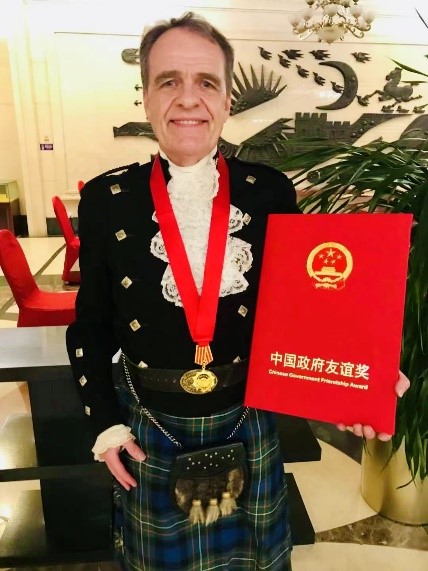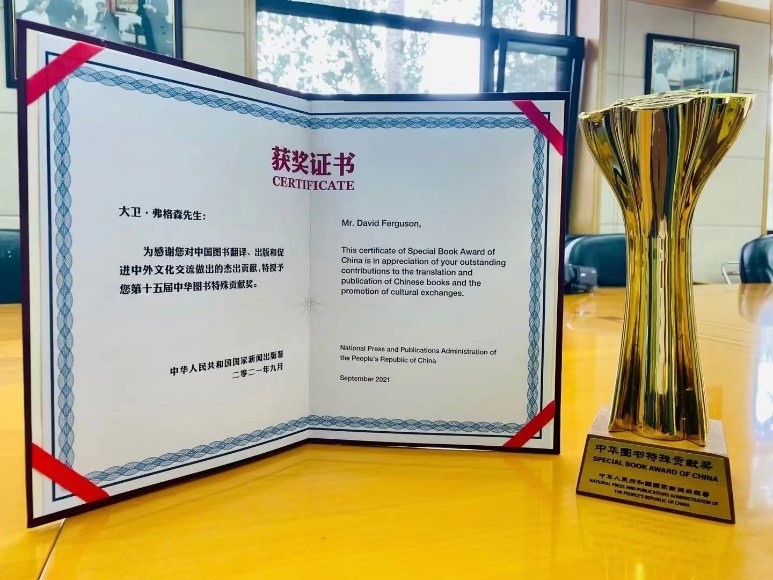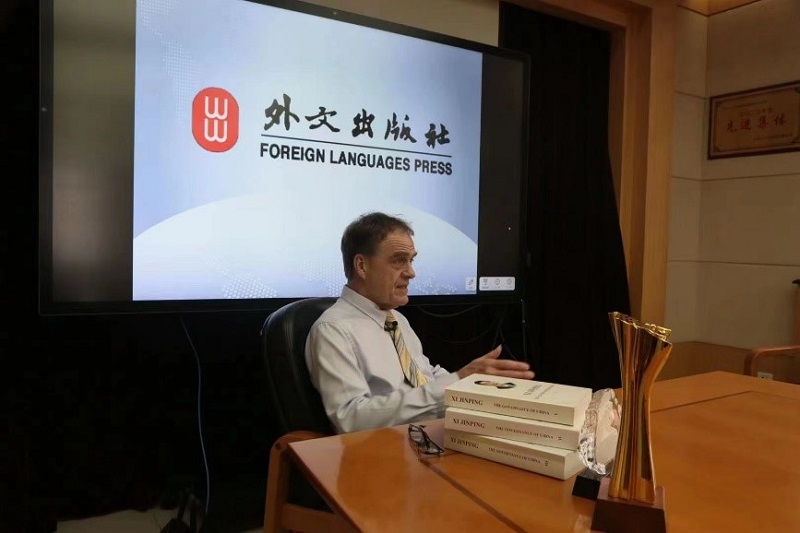风萧萧_Frank
以文会友David W. Ferguson
外文出版社主編:認為本國制度優於中國的西方人,我問你們一個簡單的問題
大卫.弗格森,外文出版社荣誉英文主编
https://www.youtube.com/watch?v=xHJgjyAmy_s&ab_channel=
People in the west always say our system is much better than China's system; because we have votes in elections, but this misses a very important Point, votes and elections are a process, not an outcome. Poor people in developing countries need outcomes, not processes. They need a roof over their heads, food on the day, clothes on the ground, school for the Kids, Safe Streets, a clean environment, Pension, Health Care, these are all outcomes not processes and China's whole process people's democracy has been very successive in delivering all these outcomes to 1.4 billion China's people, and so China's who process people's democracy is a good and effective system and to those in the west who continue to insist our system is superior to China's system. I have a very simple question, if your votes in elections are so much better than China's whole process people's democracy, why is India five times poorer than China, instead of five times richer, thank you.
The Scot Who Defends China
http://www.chinatoday.com.cn/ctenglish/2018/commentaries/202110/t20211019_800261106.html

David Ferguson receives the Friendship Award from the Chinese government on September 30.

The certificate and trophy for the Special Book Award of David Ferguson.

David Ferguson in an interview with reporters in September after he received the Special Book Award.
中国故事|大卫·弗格森:走过万里中国路的“文字匠人”
兰花奖由中国外文局发起设立,旨在表彰奖励弘扬全人类共同价值、为推进中外文化交流文明互鉴作出突出贡献的国际友人。不久前,弗格森等10位国际友人获颁首届兰花奖。颁奖词中“观中国、走中国、译中国,十五年步履不停、笔耕不辍”是对弗格森的真实写照。

大卫·弗格森在办公室向记者展示他所获得的兰花奖奖杯。新华社记者 朱昊晨 摄
走过万里中国路
在华生活工作十余年,今年67岁的弗格森在中国城乡走过万里路,也阅过万卷书。他曾是媒体记者,也是纪实作家,后入职外文出版社,参与了多本重要著作、政府白皮书的改稿润色。
2004年,弗格森初次来到中国拜访他未来的岳父岳母。“来中国之前,我对这里一无所知。”他回忆道,中英文化千差万别,但他竟完全没有“水土不服”,被中国人热情包容、重家庭、重教育等特质深深吸引,也发现这里有更多机会。
两年后,弗格森举家来到中国发展。他欣喜于“第二故乡”日新月异的变化,也忧心于西方媒体对中国的不实报道。“如果一个外国人主动要来中国当记者,我觉得对这个国家的评论至少要做到公正。”他说,出于这个原因,他决定做一名记者,讲述真正的中国故事。
在之后几年里,弗格森报道了汶川地震、北京奥运会、上海世博会等大事件,也走访多个省份记录变化发展。在他眼中,基础设施的进步折射了中国过去十年的发展。

2020年12月,弗格森第一次走进中国山区,前往甘肃省定西市和陇南市实地调研。“我们去了一个偏远的村庄。十年前,从那里到陇南市区要花上三天,而现在只需要一个小时。”他说,所有村庄都通了柏油路,山与山之间有桥梁和隧道相连,一路通途。
“基础设施建设对于扶贫和发展经济至关重要。”他说,当地博物馆展出了十年前的影像资料,村里处处是破败的房屋,村民们整天为水发愁。
“这里翻天覆地的变化都是近十年来发生的。”他说:“村民的心态也在变化。”
弗格森说,不止是在贫困地区,回顾过去,每个中国人都可以说自己比父辈过得更好;如果有孩子的话,他们也可以确信自己的孩子将享受更好的生活。
“富裕的生活需要社会的长期稳定和秩序。”他说:“因为人民需要安全感,需要知道自己今天的努力不会在明天因为社会动荡而付之一炬。”


9月22日,外文出版社荣誉英文主编大卫·弗格森在2023中华文化国际传播论坛上发言。新华社记者 金良快 摄
中国成功的密码里写着进取和韧性
弗格森认为,正是有了社会制度的保障,才让中国制定了一个个长期目标并为之接续奋斗。他说,中国特色社会主义制度是中国取得一个个瞩目成就背后的密码。
“向着富裕的生活努力工作,才能创造富裕的生活。”他说,一代代中国人的奋斗对于中国的发展同样重要。弗格森在他采访过的很多中国人身上都看到了非凡的进取心和韧性。
受外文出版社邀约,弗格森曾前往“中国近代第一城”江苏南通采风写作,结识了一些纺织业从业者。“他们没有受过正规的教育,没有钱,也没有商业和管理技能。令人难以置信的是,他们自学成才,自己创业、自己经营。”

其中一个人,在上世纪70年代初,仅背着一个装满刺绣枕套和桌布的背包,随身带着一本用拼音标记罗马尼亚语发音的工具书,就只身前往罗马尼亚推销纺织品,辗转于两国之间,一步步把跨国纺织生意做了起来。
弗格森在这些人身上看到了自己在南通“认识”的第一个人——张謇(1853年-1926年),也称他们为张謇的“继承人”。他说,张謇年轻时从未涉足工业,却能兴建造船、纺织等各种产业,办气象站、办学校,引领南通的近代化事业,“是个非常杰出的人物,无所不能”。
“他们让我深入了解中国人进取的天性特质。我理解为什么中国人在商业上能取得成功,也明白了他们在其他国家能取得成功的原因,”他说,“因为,他们对成功有巨大决心。”


大卫·弗格森在办公室接受新华社记者专访。新华社记者 朱昊晨 摄
用文字记录和观察中国
弗格森把在南通的见闻写成《南通故事》,而这次写作经历也成为他职业转型的契机。2010年,弗格森作为编辑和撰稿人加入外文出版社,工作重心由新闻报道转向编辑出版。
弗格森时常在数万字的文稿中比较、推敲,反复斟酌用词乃至标点。他说,他的工作是为了让译文在英语语境下得到最广泛的认可。
他还作为纪实作家撰写了《发现苏州》《从贫困到富饶:甘肃美丽乡村蜕变记》《生态北京:绿韵新城》等书籍,用文字记录了自己对中国的观察。
第一次听说“斜杠青年”这个词(指不满足于“单一职业”的生活方式,而拥有多重职业和身份的年轻人),弗格森认为用“斜杠”形容自己的职业轨迹恰如其分。“除了做记者、做编辑,我还会讲课、写作。”他说:“你们可能不知道,此前我还做过足球经纪人。”

致力于政治文献翻译的弗格森对于中华文化也很有兴趣。他对中国古代哲学思想、经典文学作品和历史人物都颇为熟悉,还喜爱京剧,是资深“票友”。“我的儿子不仅喜欢京剧,还会唱。他可能是苏格兰唯一一个会唱京剧的英国人了。”弗格森打趣道。
弗格森发现,中国今天的很多国家治理理念都有古代哲学的影子。“中国文化中最优秀部分已延续数千年,例如天人合一、民为邦本等等,这些仍然体现在中国的治国理政中。”他说:“比如,全过程人民民主就是天下为公的体现。”
“我投入了大量时间进行政治文献的翻译,最近打算做些不一样的事。”弗格森说,他在筹备一本书讲述浙江的故事。在他看来,政治文献翻译和创意写作都是让外国受众“读懂中国”的路径。
“建造故宫的人里面有工匠,也有帮他们搬运材料的人。翻译家就是‘运木头的人’。”他在兰花奖获奖感言中说:“我们建造的是发展、是繁荣、是世界和平。”




